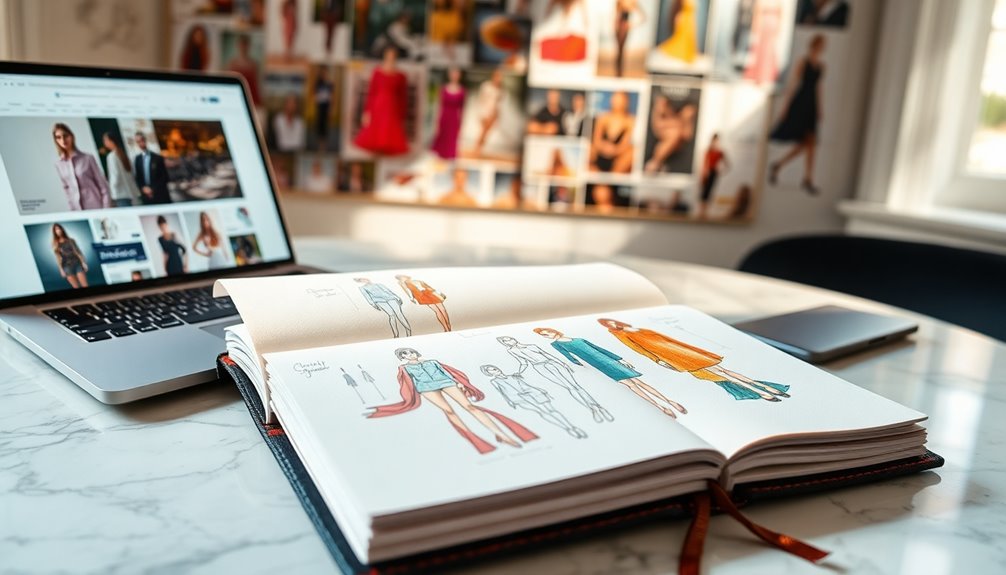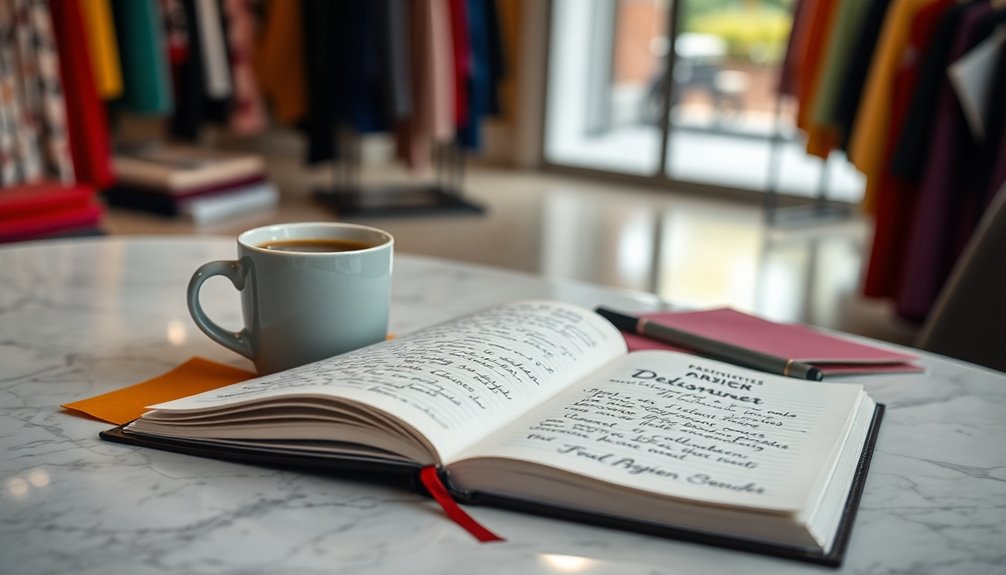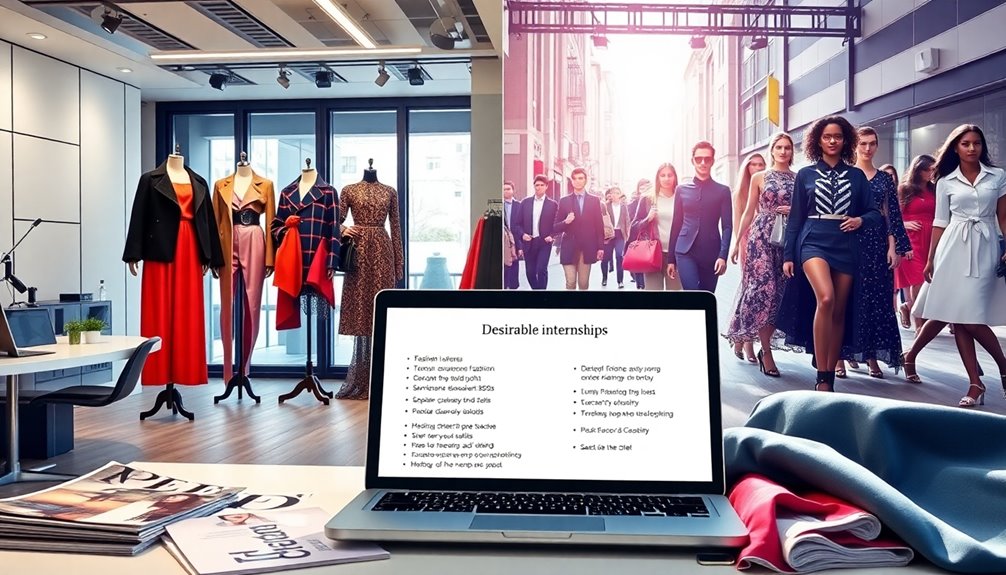When answering "Why do you want to work in fashion?" focus on your passion for creativity and the industry's impact. Share how your interests align with current trends, like sustainability or innovation. Highlight personal experiences, such as projects that inspired you or internships that honed your skills. You should mention your commitment to ethical practices and the importance of collaboration in the fashion world. Make sure you connect your motivations to the company's values, demonstrating your knowledge of their mission. This approach will show your genuine enthusiasm and fit for the role, and there's much more that can elevate your response.
Key Takeaways
- Express your passion for design and creativity, highlighting how it fuels your desire to contribute to the fashion industry.
- Emphasize your commitment to sustainability and ethical practices, showcasing your desire to make a positive impact.
- Share personal influences and experiences that shaped your interest in fashion, such as projects, documentaries, or articles.
- Discuss your understanding of industry dynamics, including technological innovations and shifts towards digital commerce.
- Highlight your career aspirations and how working in fashion aligns with your goals of addressing market gaps or becoming a reputable designer.
Understanding the Fashion Industry

Understanding the fashion industry's structure is crucial for anyone looking to break into this dynamic field. The industry comprises four main levels: raw material production, fashion goods production, retail sales, and advertising and promotion. Each level consists of various interdependent sectors, highlighting how interconnected this world is. As you navigate your career, you'll find that the design, manufacturing, distribution, marketing, retailing, and promotional aspects all play vital roles in the industry.
Since 2000, global apparel production has skyrocketed, exceeding 100 billion garments per year. Consumers now purchase over 80 billion new clothing items annually. This growth has made fashion a multi-billion dollar global enterprise, contributing significantly to the world's economic output. Additionally, the fashion industry employs millions globally, showcasing its vast impact on job creation.
However, it's essential to recognize the ethical concerns that come with this success. Low wages and poor working conditions often plague garment workers in low-income countries, reflecting the industry's darker side.
Identifying Your Personal Motivations

As you explore the intricacies of the fashion industry, it's vital to reflect on what drives your interest in this vibrant field.
Think about your love for drawing and design—how creating unique outfits allows you to express your personal style and vision. This passion isn't just about aesthetics; it also involves the business side of fashion, where you can see your sketches transform into tangible designs.
Consider the pivotal moments in your life that sparked your interest in fashion. Perhaps influential projects at school, inspiring books, or documentaries opened your eyes to the possibilities within this world.
Analyzing the latest trends while shopping or following fashion magazines can fuel your motivation further. Many consumers, including those in your age group, are increasingly drawn to fashion that aligns with their sustainability values, emphasizing a growing interest in ethical and sustainable practices.
Your career goals matter too. Do you aspire to be a reputable fashion designer known for innovative creations? Are you eager to address market gaps while prioritizing customer satisfaction? Reflecting on these aspirations can clarify your motivations.
Lastly, intrinsic values like respect for fashion's heritage, interest in sustainable practices, and the desire to make a positive impact can shape your journey.
Identifying these personal motivations won't only strengthen your passion but also guide your future in fashion.
Focusing on Key Aspects

Passion drives many aspiring fashion professionals to explore the industry's diverse facets. You might find yourself particularly drawn to the creative aspects, where design and innovation take center stage. Emphasizing your artistic vision, you can express how working with various materials and textiles excites you. Highlight your desire to be involved in the design process, from concept to final product, while collaborating with designers, pattern-makers, and suppliers. This collaboration allows you to contribute to setting new trends and styles, showcasing your commitment to creativity.
Alternatively, you may lean towards the business and marketing side. Here, you could emphasize your interest in developing and executing marketing campaigns, analyzing consumer trends, or managing brand image. Discussing how you enjoy implementing profitable pricing strategies and utilizing digital tools can demonstrate your understanding of the industry's dynamics, including the importance of administrative tasks in maintaining brand operations.
Lastly, don't overlook sustainability and ethical practices. If you're passionate about eco-friendly materials and fair labor practices, mention your commitment to reducing environmental impact and promoting social responsibility.
Demonstrating Industry Knowledge

Demonstrating your knowledge of the fashion industry can set you apart in interviews and networking opportunities. To make a strong impression, stay updated on current trends. For instance, sustainability is a major focus, with many brands adopting circular fashion systems and using biodegradable materials. The rise in environmentally-conscious consumer demand has also prompted brands to prioritize sustainable practices in their offerings.
Minimalism remains popular, but maximalist luxury is emerging as a bold alternative, showcasing dramatic designs and impactful accessories.
Additionally, awareness of technological innovations is crucial. Smart clothing, featuring sensors and temperature-regulating fabrics, is reshaping functionality in fashion. Digital advancements like social commerce and the Metaverse are transforming how brands engage with customers online.
Moreover, embrace the industry's shift towards social and environmental responsibility. Understanding the importance of diversity, inclusivity, and sustainable practices can demonstrate your commitment to ethical fashion.
Finally, keep an eye on industry shifts, such as creative director changes and the rise of online sales. Recognizing how these factors influence the market can showcase your insight and passion.
Linking to Your Desired Role

Linking your aspirations to a specific role in the fashion industry is crucial for making a compelling case during interviews. Start by thoroughly understanding the key duties and expectations of the position you want. Research the required skills, qualifications, and the department you'll be working in. This knowledge allows you to tailor your responses effectively.
Next, connect your personal skills and experience to the role. Highlight relevant abilities like creativity or communication, and mention any coursework or training that prepares you for this position. Discuss past projects that showcase your capabilities, emphasizing how they align with the company's needs. Understanding the importance of adaptability in the fashion industry can also enhance your response, as it demonstrates your readiness to respond to evolving trends.
Align your aspirations with the company's values and goals. Research their mission and core values, and explain how these resonate with your professional objectives. Discuss specific initiatives that excite you and how you can contribute to the company's success.
Finally, express genuine enthusiasm for the role. Share what aspects of the job you find most appealing and how it fits into your long-term career plans. A clear vision of your contributions shows your commitment and helps you stand out in the competitive fashion industry.
Showing Passion for Fashion

When it comes to expressing your enthusiasm for a career in fashion, sharing specific inspirations can make a significant impact. Think back to pivotal moments that ignited your passion. Was it a breathtaking runway show, a captivating collection, or a designer whose work resonates with you? Mention these experiences to illustrate your dedication.
Delve into the magazines or articles that opened your eyes to the fashion world. Perhaps a particular issue of Vogue or a feature on sustainability shifted your perspective. Books and documentaries can also provide crucial insights, so share any that fueled your passion. Maximalist luxury has recently captivated my attention, showcasing the bold creativity that drives the industry forward.
Consider school projects or experiences that were influential in shaping your career path. Did you organize a fashion event, or create a marketing campaign? Highlighting these instances shows your proactive nature.
Additionally, express your commitment to industry values, like sustainability and inclusivity. Discuss how you want to contribute positively to these issues and align with the company's ethos.
Highlighting Relevant Experiences

Your experiences in fashion can set you apart in an interview, showcasing not just your passion but also your preparedness for the industry. Start by highlighting your educational background, such as any degrees in fashion design or merchandising, and courses that have equipped you with essential skills. If you've participated in pre-college programs or attended reputable fashion schools, mention that to strengthen your credibility.
Next, emphasize relevant projects and internships. Talk about your involvement in school projects, any internships with notable fashion brands, or experience at fashion shows and exhibitions. Internships in art museums and fashion brands can also enhance your experience and networking opportunities, critical for career advancement.
If you've developed a personal blog or contributed to fashion clubs, this demonstrates your initiative and engagement with the industry. Don't forget to focus on specific skills you've developed along the way. Whether it's mastering Adobe Creative Suite or honing your market research abilities, these skills are vital.
If you've held roles in retail or participated in marketing campaigns, share those experiences to illustrate your hands-on knowledge.
Aligning With Company Values

Aligning with a fashion company's values can significantly enhance your appeal as a candidate. Start by researching the core values that the company emphasizes, whether it's sustainability, innovation, or craftsmanship. When you articulate how these values resonate with your personal and professional goals, you demonstrate genuine interest and alignment.
Mention specific initiatives or projects the company is involved in that reflect these values. For example, if the company prioritizes sustainable practices, share your own commitment to sustainability and how you can contribute.
Show that you understand the importance of respect and inclusivity in the workplace, which often underpins a company's culture. An inclusive and respectful workplace not only fosters collaboration but also enhances creativity and innovation within teams.
Provide examples of how your past experiences embody the company's values. If the company values creativity, discuss your innovative approach in previous roles.
Connect these values to the responsibilities of the position you're applying for, illustrating how you'll uphold them in your daily work. By emphasizing your alignment with the company's mission, you not only showcase your fit for the role but also express a clear commitment to contributing positively to its culture.
Committing to Continuous Learning

Understanding a company's values is just the beginning of your journey in fashion; committing to continuous learning is equally important. To stay relevant in this fast-paced industry, actively seek out opportunities to expand your knowledge and skills.
Attend workshops, seminars, and masterclasses hosted by industry experts. Events like Premiere Vision and Texworld are invaluable for gaining insights into cutting-edge techniques and trends.
Don't overlook online courses on platforms like Udemy or Coursera; they cover everything from fashion design to sustainable practices. Participate in continuing education programs offered by fashion schools to deepen your expertise. Additionally, consider engaging in networking events to connect with other professionals and gain insights into current industry practices.
Staying updated with industry events is crucial, too. Attend local fashion shows and international conferences to connect with professionals and observe emerging trends.
Engaging in self-directed learning through blogs, YouTube tutorials, and books can also enhance your understanding of fashion history and theory.
Frequently Asked Questions
What Are Common Misconceptions About Working in the Fashion Industry?
When you think about working in the fashion industry, you might believe it's all about creativity and glamour.
However, many professionals handle routine tasks and long hours, just like in any other field. Not everyone designs clothes, and degrees in unrelated fields can be just as valuable.
Plus, networking helps, but it's not the only way to land a job.
Realistically, the fashion world is intense, with a mix of creativity and practicality.
How Can I Break Into the Fashion Industry Without Formal Education?
To break into the fashion industry without formal education, start by gaining practical experience through internships or volunteer opportunities.
Look for roles that align with your interests, whether in design, marketing, or sustainability.
Take online courses to develop relevant skills and familiarize yourself with industry tools.
Networking is crucial, so connect with professionals in the field for advice.
Most importantly, stay passionate and proactive, showcasing your unique perspective and dedication.
What Skills Are Most Valuable for Entry-Level Positions in Fashion?
To break into entry-level positions in fashion, you'll want to focus on key skills.
Sketching and illustration are essential for expressing your design ideas. Understanding fabric selection and garment construction will set you apart. Proficiency in CAD software is vital in today's digital landscape.
Don't underestimate soft skills either; effective communication, teamwork, and adaptability are crucial for collaboration.
Lastly, staying updated on trends can give you a competitive edge in the industry.
How Important Is Networking in the Fashion Industry?
Networking's incredibly important in the fashion industry.
It opens doors to opportunities, connects you with key players, and helps you stay updated on trends.
By attending events and engaging with professionals on social media, you'll build relationships that can lead to collaborations and mentorships.
What Are Some Alternative Career Paths Within the Fashion Industry?
If you’re exploring alternative career paths in the fashion industry, consider options like costume design for entertainment, where you bring characters to life. Another potential avenue is fashion side hustles, such as starting a small online boutique or offering fashion consulting services. These opportunities allow you to flex your fashion expertise in a more entrepreneurial and creative way, while still honing your skills and building your portfolio. Whether it’s creating costumes for film and television or running your own fashion side hustles, there are plenty of unique and exciting paths to explore in the fashion industry.
Fashion journalism lets you write about trends and interview industry insiders.
Sustainability roles focus on eco-friendly practices in fashion.
Retail and buying involve selecting products based on market trends.
Each path offers unique opportunities to express your creativity and passion while contributing to the evolving fashion landscape.
Conclusion
In conclusion, when answering "why do you want to work in fashion," make sure to connect your personal motivations with the key aspects of the industry. Show your passion, highlight relevant experiences, and align your values with the company's mission. By demonstrating your knowledge and commitment to continuous learning, you'll create a compelling narrative that resonates with potential employers. Remember, authenticity shines through, so let your enthusiasm for fashion truly reflect in your response.









